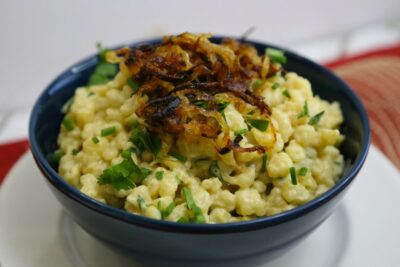What is the National dish of Liechtenstein
The National dish of Liechtenstein is Käsknöpfle

Cultural Significance of Käsknöpfle
Käsknöpfle is more than just a popular meal; it is a symbol of Liechtenstein’s rich cultural and culinary heritage. This traditional dish is deeply embedded in the daily lives of the people, representing the flavors, techniques, and culinary traditions unique to Liechtenstein. The dish is prepared in a manner that showcases the traditional cooking methods passed down through generations, preserving the authenticity of the dish while allowing it to evolve with modern culinary trends.
Käsknöpfle in Social and Festive Occasions
In Liechtenstein, food is not just sustenance; it is an essential part of social gatherings, celebrations, and even religious ceremonies. Käsknöpfle, being the national dish, holds a special place in these occasions. For many families, the preparation of Käsknöpfle is a communal activity that brings people together. This dish is often served during festivals, holidays, and family reunions, making it a staple in the country’s most cherished moments.
Culinary Influence and Regional Variations
The preparation of Käsknöpfle is a reflection of the country’s diverse culinary influences. These influences are evident in the ingredients and cooking techniques used in Käsknöpfle. For example, [provide an example of a key ingredient or technique], which is a hallmark of this dish, was introduced by [specific culture or historical event] and has since become a fundamental part of Liechtenstein’s culinary identity.
What makes Käsknöpfle particularly special is its versatility. While the basic recipe remains the same, there are regional variations that add to the dish’s complexity. In [specific region or city within the country], Käsknöpfle might be prepared with [regional variation of ingredients or cooking style]. This variation not only highlights the local produce but also the unique culinary preferences of the people in that area. These regional differences are celebrated and contribute to the overall richness of Liechtenstein’s food culture.
Serving and Accompaniments
The dish is typically served with [common side dishes or accompaniments], which complement its flavors and enhance the overall dining experience. For instance, in Liechtenstein, it is common to enjoy Käsknöpfle with [side dish], a combination that balances the rich flavors of the dish with [describe the taste or texture of the side dish]. Additionally, the dish is often paired with [traditional beverage], which is believed to enhance the flavors of the meal and provide a complete gastronomic experience.
Käsknöpfle as a Source of National Pride
For many people in Liechtenstein, Käsknöpfle is more than just a meal; it is a source of pride. It represents the resilience and creativity of the people, who have perfected this dish over generations, using what the land and sea provide. It is a reminder of the shared history and values that unite the country’s diverse population. Whether enjoyed at a street food stall or in a high-end restaurant, Käsknöpfle remains a symbol of Liechtenstein’s identity and a testament to its rich culinary tradition.
Global Recognition of Käsknöpfle
The global recognition of Käsknöpfle has also put Liechtenstein on the map as a destination for food lovers. Visitors from around the world come to experience the authentic flavors of Käsknöpfle, eager to taste the dish that encapsulates the essence of Liechtenstein. Many tourists leave with a newfound appreciation for the country’s culinary heritage, often trying to replicate the dish at home, although it is said that the true taste of Käsknöpfle can only be experienced in Liechtenstein, where the preparation is most authentic.
Conclusion
In conclusion, Käsknöpfle is more than just the national dish of Liechtenstein; it is a culinary emblem that carries with it the history, culture, and soul of the nation. It is a dish that unites people, celebrates diversity, and continues to evolve while staying true to its roots. As you explore the flavors of Käsknöpfle, you are not just tasting food; you are experiencing the essence of Liechtenstein itself.
Liechtenstein National symbols
⏪ Back to the national symbols of Liechtenstein
What is Liechtenstein known for?
Liechtenstein is known for the Vaduz Castle, Gutenberg Castle, and the Red House
Where is Liechtenstein located?
Neighbours of Liechtenstein
Questions & Answers about Liechtenstein
- Who is the national founder of Liechtenstein?
- Who is the national poet of Liechtenstein?
- When is the national day of Liechtenstein?
- What is the national animal of Liechtenstein?
- What is the ethnicity of Liechtenstein?
- What is the national dish of Liechtenstein?
- What is the national dance of Liechtenstein?
- What is the national emblem / coat of arms of Liechtenstein?
- What is the religion of Liechtenstein?
- What is the ISO-4217 of Liechtenstein?
- What is the domain extension of Liechtenstein?
- What is the national monument of Liechtenstein?
- What is the national anthem of Liechtenstein?
- What is the national fruit of Liechtenstein?
- What is the national flower of Liechtenstein?
- What is the national colors of Liechtenstein?
- What is the national language of Liechtenstein?
- What is the national sports of Liechtenstein?
- What is the national tree of Liechtenstein?
- What is the national bird of Liechtenstein?
- What is the national currency of Liechtenstein?
- What is the country code of Liechtenstein?
- What is the capital city of Liechtenstein?
- What is the national airline of Liechtenstein?
- What is the national drink of Liechtenstein?
- What is the national instrument of Liechtenstein?
- What is the national dress of Liechtenstein?
- What is the national hero of Liechtenstein?
- What is the national mausoleum of Liechtenstein?
- What is the nationality of Liechtenstein?
- What is the driving side of Liechtenstein?
- What is the date format of Liechtenstein?
- What is the total area of Liechtenstein?
- What is the timezone of Liechtenstein?
- What is the national football team of Liechtenstein?
- What is the tourism slogan of Liechtenstein?
- What is the literacy rate of Liechtenstein?
- What is the average elevation of Liechtenstein?
- What is the coastline of Liechtenstein?
- What type of plugs and sockets are used in Liechtenstein?
- What are the emergency telephone numbers of Liechtenstein?
- What is the alternative name of Liechtenstein?
- What is the mythical creature of Liechtenstein?
- What is the national government of Liechtenstein?
- Who is the president of Liechtenstein?
- Who is the prime minister of Liechtenstein?
- What are the proverbs of Liechtenstein?



